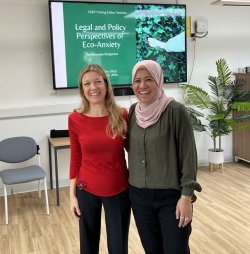Addressing eco-anxiety through law and policy: first reflections in the light of recent climate litigation cases
Posted on behalf of: Dr Emanuela Orlando; Prof Dr Siti Hafsyah Idris
Last updated: Tuesday, 10 October 2023

Climate Litigation before the European Court of Human Rights
Last week [27 September 2023] the European Convention on Human Rights (ECtHR) Grand chamber held its first hearing in a groundbreaking case – Agostinho Duarte and Others v Portugal and 32 Other States. The case originates from the devastating forest fires that have occurred in Portugal each year since 2017 and which the claimants – six young Portuguese nationals aged between 11 and 24 – allege are a direct result of climate change and the ensuing global warming. The Portuguese applicants claim that their fundamental rights to life, and to private and family life, as set out in Articles 2 and 8 of the European Convention on Human Rights are being violated due to the Governments’ long-standing neglect of their duty to protect them against the effects of climate change and to cut greenhouse gas emissions in line with the 2015 Paris Agreement. A ruling in the Duarte Agostinho case is expected in the first half of 2024.
This is not the only climate change-related case lodged with ECtHR; yet it is unprecedented in several respects. First, the action is being brought simultaneously against Portugal and other 32 state parties of the ECHR in a bold move to overcome the principle of prior exhaustion of domestic remedies, and raising a number of important and interesting questions concerning the extraterritorial, jurisdictional dimension of climate harm. Secondly, from an intersectional climate, environmental and human rights perspective, the applicants’ submission and their written evidence explicitly highlight the anxiety and psychological distress they suffer due to the uncertainty surrounding their future and the threat of harm they face. In this respect, this landmark trial is also a testimony of the way the law is slowly grappling with the increasingly widespread phenomenon of climate anxiety. Indeed, while the Duarte Agostinho case is currently pending before the ECtHR, in August this year the State of Montana’s District Court rendered an important judgment in the case Held v State, in which, among other things, it explicitly included climate within the plaintiff’s fundamental right to a clean and healthful environment. Evidence produced in this case included also plaintiffs’ and experts’ witnesses testifying about the psychological harm and the distress caused by climate change on Montana’s youth population, including the youth plaintiffs.
So, what exactly is climate anxiety?
On the occasion of today’s World Mental Health Day [10 October 2023] we would like to shine a light on this relatively recent phenomenon, also known more broadly as eco-anxiety, which is gaining increasing attention, especially among the medical and scientific communities. A 2017 report by the American Psychological Association (APA) and EcoAmerica defines eco-anxiety as a ‘chronic fear of environmental doom’, which arise from ‘watching the slow and seemingly irrevocable impacts of climate change unfold, and worrying about the future for oneself, children, and later generations’. However, the mental health impacts of climate change and the emotions, triggered by gradual, long-term changes in climate and the environment, are very diverse, multifaceted and wide-ranging. In this respect, scientific literature tends to distinguish between the direct impacts suffered by those who witness first-hand the effects of climate change, such as catastrophic flooding events, and which ‘directly raise the risk of experiencing post-traumatic stress disorder…and extreme distress’; and the more indirect mental health impacts linked to the ‘awareness of the climate crisis’ with the potential to result in emotional and mental distress. These studies also point to the equity and justice implications of this phenomenon, as they suggest that those living in poorer regions also tend to be more exposed to climate-related disasters and therefore to associated mental health impacts. Additionally, there is an intergenerational dimension of climate justice: younger generations, despite being the least responsible for emissions, will inevitably bear the brunt of the harshest consequences of climate change, with children being the most vulnerable group, as highlighted in a report by the UN Special Rapporteur on human rights and the environment.
The role of law and policy
The intersection of climate change and mental health raises several questions about the role of law and policy in addressing these issues. While there’s a growing body of scientific literature documenting the impact of climate change and environmental degradation on mental health and wellbeing, including the specific matter of eco-anxiety, there is little exploration of those aspects from a legal perspective.
Our recent research collaboration between the University of Sussex and Universiti Teknologi MARA, Malaysia seeks to address this gap and contribute a legal dimension to the academic debate on eco-anxiety. The SSRP Visiting Research Fellowship gave a significant input to this research project, allowing Associate Prof Dr Siti Hafsyah Idris to visit Sussex in September. The fellowship enabled us to connect with other researchers working on these themes from various disciplinary perspectives, and to deliver a research seminar on the topic of eco-anxiety from the Malaysian perspective, a country in the global south, which is increasingly impacted by adverse weather events caused by the changing climate. Taking an interdisciplinary approach is crucial to fully comprehend climate anxiety as a phenomenon, its psychological and social consequences on individuals and communities, and to better understand the role that law and policy frameworks can play in this context.
We therefore hope that this is the starting point of a longer term and fruitful interdisciplinary collaboration on this highly topical issue. If you would like to hear more about the legal and policy implications of eco-anxiety or get involved in this research initiative, please get in touch.

Written by Dr Emanuela Orlando, SSRP Research Fellow and Senior Lecturer in Environmental Law (School of Law, Politics and Sociology, University of Sussex, UK) and Prof Dr Siti Hafsyah Idris, SSRP Visiting Fellow and researcher in biosafety law, bioethics and environmental law (Universiti Teknologi MARA, Malaysia).

